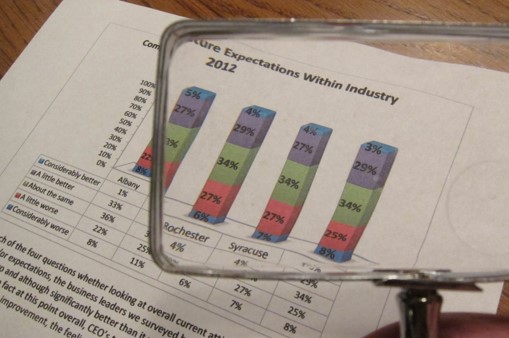Siena College: 10th Annual Upstate New York Business Leader Survey
CEO Confidence Up; Cap Region Hits 10-Year High, Buffalo, Syracuse Rise Sharply, Rochester Unchanged
Across Upstate Expect Increasing Revenues, Profits & Hiring
Business Leaders Say Health Care Costs, Regulation Hurt Bottom Line; Growing Number Now Confident Federal Govt. Will Improve Economy
64% Expect to be in Business in NY in Ten Years; 21% Predict Better Business Climate in Decade to Come, 35% Expect Worsening
Loudonville, NY. Across Upstate New York, CEO confidence rose by 9 points this year demonstrating more optimism than pessimism among leaders of private for-profit companies according to the tenth annual Upstate New York Business Leader Survey from Siena College sponsored by the Business Council of New York State, Inc. The Index of Business Leader Confidence, computed based on interviews with 440 business leaders of companies from Buffalo, the Capital Region, Rochester and Syracuse stands at 103.8, up from 94.8 last year, above the breakeven point of 100 at which overall optimism and pessimism towards the current and future economic conditions are balanced.
“The CEO’s of the Capital Region increased in confidence establishing a ten year high overall, and setting a record at 121.1 for future confidence for any region. Across Upstate, Business Leaders tend to say that 2016 was flat but that they expect the New York economy to improve in 2017. Fifty-one percent, up from 45 percent, anticipate revenue growth and 43 percent, up from 35 percent, expect their profits to increase in 2017. Thirty-nine percent, the highest number we’ve seen, plan to increase the size of their workforce this year,” said Siena College Research Institute Director Don Levy.
Driven primarily by increasing confidence in the future, the Capital Region’s overall index was up 7.3 to 112.5, Buffalo rose 14.1 to 106.3 and Syracuse increased 9.6 to 101.4. Rochester was virtually unchanged at 88.7.
CEO’s cite health care costs (79 percent), governmental regulation (68 percent) and taxation (57 percent) as challenges that they are concerned about. Only 19 percent of CEO’s (unchanged) think local government is doing either an excellent or good job supporting business and only 15 percent (up from 13 percent) are confident in the ability of New York’s government to improve the business climate. But, this year with a new administration in Washington, confidence in the federal government’s ability to improve business conditions rose sharply from only seven percent to 32 percent today.
“While we are happy to see that as a group Upstate CEO’s are more confident than last year, it is clear more work needs to be done,” according to Heather C. Briccetti Esq., president and CEO of The Business Council of New York State. “Business owners are clamoring for economic freedom and remain deeply pessimistic that government, especially state government, is prepared to relieve their burden. The Business Council, through our 2017 ‘Back to Business’agenda, stands ready to fight for the regulatory and legislative changes necessary to get the state’s economy moving and bring real optimism back to the Empire State.”
Thirty-nine percent (up from 29 percent) of Upstate CEO’s now say that if they had it to do all over again considering all factors, that they would locate their business in New York and 64 percent expect their business will be in business in New York in ten years. Still, only 21 percent think that the overall business climate will have improved ten years from today while 39 percent think things will have remained the same and 35 percent expect that in 2026 conditions will have worsened. Majorities think that demand for their product or service, the quality of local infrastructure, growth opportunities, the business friendliness of the federal government, and being able to profit in New York will be at least the same if not better in ten years but when it comes to governmental regulation (57 percent) and taxation (49 percent) about half or more expect worsening.
Across Upstate, 64 percent of CEO’s say that minorities have as much opportunity as white Americans to be successful while 17 percent think that they have less opportunity. Still, 59 percent say that minorities receiving appropriate training prior to being hired is either a somewhat or very significant problem and 77 percent support partnerships in their area between private business, educational institutions, and community groups to increase employment among both urban youth and underemployed or unemployed urban adults.
Fifty-one percent of Upstate CEO’s, down from 55 percent a year ago, plan to invest in fixed assets in 2017.
“It has been quite a decade! After enduring a crippling economic collapse and fighting through a slow recovery, Upstate CEO’s, especially the most optimistic, are more confident than they’ve been in years, and focused more than ever before on growing demand for their product or services more so than cutting costs. But, with only 28 percent saying their local area is a place where businesses can succeed and 39 percent saying that they would locate their firm in the Empire State if they had it to do all over again, Upstate CEO’s are still feeling the pinch. They have growing confidence in the federal government, plan to hire and expect a strong year but they continue to ask for relief from health care costs, and support lessening regulation as well as tax reform,” Levy says.
This Siena College Poll was conducted October – December 2016 by telephone, mail and internet interviews with 440 Business Leaders from the Albany, Buffalo, Rochester and Syracuse MSA’s. Sponsorship for the 2016 Upstate Business Leader Survey was provided by The Business Council of New York State. In each of the four MSA’s the study is released in conjunction with the following media partners: Albany: The Albany Business Review; Buffalo: Buffalo Business First; Rochester: The Rochester Business Journal; Syracuse: The Central New York Business Journal. The Siena College Research Institute, directed by Donald Levy, Ph.D., conducts political, economic, social and cultural research primarily in New York State. SRI, an independent, non-partisan research institute, subscribes to the American Association of Public Opinion Research Code of Professional Ethics and Practices. For more information, call Don Levy at (518) 783-2901 or dlevy@siena.edu. For survey cross-tabs and frequencies: www.Siena.edu/SCRI





